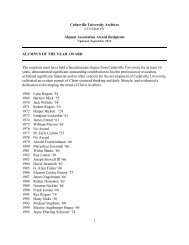Department of History anD Government - Cedarville University
Department of History anD Government - Cedarville University
Department of History anD Government - Cedarville University
You also want an ePaper? Increase the reach of your titles
YUMPU automatically turns print PDFs into web optimized ePapers that Google loves.
<strong>Department</strong> <strong>of</strong><strong>History</strong> and <strong>Government</strong>Mission Statement (Page 97)<strong>Department</strong> Objectives (Page 97)Personal Requirements (Page 97)<strong>Department</strong> Requirements (Page 97)Technical Resources (Page 97)Programs <strong>of</strong> Study (Page 97)Cocurricular Opportunities (Page 97)Center for Political Studies (Page 98)Career Opportunities (Page 98)Faculty (Page 98)Majors»»Criminal Justice (Page 99)»»<strong>History</strong> (Page 100)»»Forensic Science (Page 100)»»<strong>History</strong> and Political Science (Page 101)»»International Studies — Social Science (Page 102)»»Political Science (Page 103)»»Prelaw (Page 104)»»Public Administration (Page 105)»»Social Studies Education — Integrated (Page 107)»»Sociology (Page 106)Minors»»Church <strong>History</strong> Minor (Page 109)»»Criminal Justice Minor (Page 109)»»<strong>History</strong> Minor (Page 109)»»International Studies — Social Science Minor (Page 109)»»Political Science Minor (Page 109)»»Public Administration Minor (Page 109)»»Public Policy Minor (Page 109)»»Sociology Minor (Page 109)
Introduction Admissions Academic Information Academic <strong>Department</strong>s Course Descriptions Financial Information Appendix Index<strong>Department</strong> <strong>of</strong> <strong>History</strong> and <strong>Government</strong> | College <strong>of</strong> Arts and SciencesMission StatementThe goal <strong>of</strong> the <strong>Cedarville</strong> <strong>University</strong> <strong>Department</strong> <strong>of</strong> <strong>History</strong>and <strong>Government</strong> is to develop ethical, intellectually prepared, andarticulate graduates who can refine and integrate an evangelicalChristian worldview in their specific disciplines from a reasonedpolitical, economic, and historical perspective, and who can thenserve effectively in a diverse global community.<strong>Department</strong> ObjectivesUpon completion <strong>of</strong> courses in the history and governmentdepartment, students will:• Evidence knowledge <strong>of</strong> the basic components <strong>of</strong> theirrespective academic disciplines.• Participate in graduate study and/or practice as pr<strong>of</strong>essionalsin public and private pr<strong>of</strong>essions.• Demonstrate competence in the methods and tools <strong>of</strong>original quantitative and qualitative research and the ability t<strong>of</strong>ormulate and express the results.• Exhibit critical analysis in evaluating historical and/orcontemporary issues.• Display the ability to integrate biblical truth with theiracademic disciplines through the investigation and study <strong>of</strong>society.Personal RequirementsA solid high school college-preparatory program provides anexcellent background for students entering the various majors inthe department.<strong>Department</strong> RequirementsTo graduate with a degree from the department <strong>of</strong> history andgovernment, students must earn a cumulative average <strong>of</strong> 2.0 orhigher and a “C-” or higher in all courses required by their selectedmajor. In addition, all majors must complete the following:1. A senior research project under the direction <strong>of</strong> a facultyadvisor. This research project will also be directed by athree-member committee that shall be selected with theadvice <strong>of</strong> their research director and will include at leastone pr<strong>of</strong>essional member outside the department <strong>of</strong> historyand government.2. A presentation <strong>of</strong> selective senior research projectspresented to invited faculty, students, and guests.3. A major field content assessment exam in their area at thescheduled time during the spring semester <strong>of</strong> their senioryear (as required).Technical ResourcesA large number <strong>of</strong> computer s<strong>of</strong>tware programs are available tostudents, including:• A variety <strong>of</strong> presentation programs• Database programs• JStor Research Database• Spreadsheet programs• Statistical analysis programs• Various search engines• Word processing programs• Web and HTML programsSeveral <strong>of</strong> the department programs prepare students forcareers directly following graduation. Through a variety <strong>of</strong>modalities (including field work and class presentation bypractitioners), students are able to network with actual careerrepresentatives and on occasion be exposed to the technologiesbeing utilized by a career area.Programs <strong>of</strong> StudyThe department <strong>of</strong> history and government <strong>of</strong>fers the followingprograms <strong>of</strong> study:Bachelor <strong>of</strong> Arts (B.A.) in:• Criminal Justice• <strong>History</strong>• <strong>History</strong> and Political Science• International Studies — Social Science• Political Science• Prelaw• Public Administration• Social Studies Education — Integrated• SociologyBachelor <strong>of</strong> Science (B.S.) in:• Forensic Science**In cooperation with the department <strong>of</strong> science and mathematics; see page 174.Minors• Church <strong>History</strong>• Criminal Justice• <strong>History</strong>• International Studies — Social Science• Political Science• Public Administration• Public Policy• SociologyCocurricular OpportunitiesEach major has several pr<strong>of</strong>essional organizations in whichstudents may participate. Students can also broaden theirunderstanding and knowledge through a variety <strong>of</strong> travelopportunities, internships, and student organizations.Alpha Delta NuAlpha Delta Nu provides criminal justice students with theopportunity to enhance their pr<strong>of</strong>essional development. Membersare students who believe that a career in criminal justice is aministry in a God-ordained institution, which is government. Thisorganization promotes Christian character, leadership, and servicethrough training, information, and networking to supplementacademic studies. The society assists students to prepare for atransition to their pr<strong>of</strong>essional field as practitioners.College DemocratsCollege Democrats is an organization dedicated to thedevelopment <strong>of</strong> Christian leaders in the political arena.College RepublicansCollege Republicans is an organization dedicated to thedevelopment <strong>of</strong> Christian leaders in the political arena.<strong>History</strong> and <strong>Government</strong> Association<strong>History</strong> and <strong>Government</strong> Association is a student organizationthat provides opportunities for students to grow in theirappreciation <strong>of</strong> the fields <strong>of</strong> history and government and providean outlet for pursuing knowledge, obtaining academic support,gaining fellowship, and providing service.Model United Nations TeamModel United Nations Team is a simulation <strong>of</strong> the UnitedNations system. Students assume the roles <strong>of</strong> ambassadorsto the United Nations and negotiate current global issues.The <strong>Cedarville</strong> <strong>University</strong> Model UN Team participates in anintercollegiate competition in which participants seek to deal withcomplex global concerns such as the environment, economicdevelopment, refugees, AIDS, disarmament, and human rights.As representatives <strong>of</strong> UN member nations, team membersmust master a great deal <strong>of</strong> detailed information about nationalpolicies while remaining in character—responding to debatesand negotiations in the same manner as a UN delegate from thatnation.Page 97 2012–13 Undergraduate Catalog
Introduction Admissions Academic Information Academic <strong>Department</strong>s Course Descriptions Financial Information Appendix Index<strong>Department</strong> <strong>of</strong> <strong>History</strong> and <strong>Government</strong> | College <strong>of</strong> Arts and SciencesOmega MuOmega Mu is the <strong>Cedarville</strong> <strong>University</strong> chapter <strong>of</strong> Pi SigmaAlpha – the National Political Science Honor Society. The goal<strong>of</strong> this honor society is to promote the scholarly investigation <strong>of</strong>politics and to assist its members in developing their leadershippotential in their sphere <strong>of</strong> influence.Renaissance GuildRenaissance Guild increases learning and awareness <strong>of</strong> themedieval and Renaissance eras and provides fellowship with likemindedindividuals.Center for Political StudiesThe Center for Political Studies at <strong>Cedarville</strong> <strong>University</strong> wasfounded to articulate a biblical view <strong>of</strong> government throughthe study <strong>of</strong> politics, law, history, and public policy; to educate<strong>Cedarville</strong> <strong>University</strong> faculty, staff, students, and constituents; andto engage and influence American political culture. The Centersponsors, among other programs, regular lecture series and anannual roundtable discussion <strong>of</strong> contemporary political issues.Career OpportunitiesGraduates <strong>of</strong> the department have attended some <strong>of</strong> thenation’s outstanding graduate and pr<strong>of</strong>essional schools. Careerspursued by graduates include:• Administrator • <strong>Government</strong> worker• Archaeologist • High school teacher• Archivist • Historical researcher• Attorney • Librarian• Campaign Manager • Parole agent• City Manager • Politician• College Pr<strong>of</strong>essor • Police <strong>of</strong>ficer• Community developer • Prison caseworker• Diplomat • Prison manager (warden)• Federal law enforcer • Probation <strong>of</strong>ficer• Forensic scientist • Public administratorFacultyThomas Mach, Chair, Pr<strong>of</strong>essor <strong>of</strong> <strong>History</strong>. Education: B.A.,<strong>Cedarville</strong> <strong>University</strong>, 1988; M.A., Cleveland State <strong>University</strong>, 1989;Ph.D., <strong>University</strong> <strong>of</strong> Akron, 1996. At <strong>Cedarville</strong> since 2000.Marc Clauson, Pr<strong>of</strong>essor <strong>of</strong> <strong>History</strong>. Education: B.S., Marshall<strong>University</strong>, 1978; M.A., Marshall <strong>University</strong>, 1979; J.D., WestVirginia <strong>University</strong>, 1982; M.Th., Liberty <strong>University</strong>, 1993; M.A.,Liberty <strong>University</strong>, 1993; Ph.D., <strong>University</strong> <strong>of</strong> the Orange FreeState, South Africa, 2001. At <strong>Cedarville</strong> since 2002.Glen Duerr, Assistant Pr<strong>of</strong>essor <strong>of</strong> International Studies.Education: B.A., <strong>University</strong> <strong>of</strong> Western Ontario, 2003; M.A.,<strong>University</strong> <strong>of</strong> Windsor, 2005; Ph.D., Kent State, 2012. At <strong>Cedarville</strong>since 2012.Frank Jenista, Pr<strong>of</strong>essor <strong>of</strong> International Studies. Education:B.A., <strong>Cedarville</strong> <strong>University</strong>, 1968; M.A., <strong>University</strong> <strong>of</strong> Dayton, 1970;Ph.D., <strong>University</strong> <strong>of</strong> Michigan, 1978. At <strong>Cedarville</strong> since 2000.Jewerl Maxwell, Assistant Pr<strong>of</strong>essor <strong>of</strong> Political Science.Education: B.A., Muskingum College, 2003; M.S., Miami<strong>University</strong>, 2004; Ph.D., Miami <strong>University</strong>, 2008. At <strong>Cedarville</strong> since2009.Murray Murdoch, Senior Pr<strong>of</strong>essor <strong>of</strong> <strong>History</strong>. Education: B.Th.,Baptist Bible Seminary, 1960; M.A., Northwestern <strong>University</strong>, 1962;<strong>History</strong> Faculty Fellow, Northwestern <strong>University</strong>, 1963; Ph.D.,Northwestern <strong>University</strong>, 1971. At <strong>Cedarville</strong> since 1965.Patrick Oliver, Assistant Pr<strong>of</strong>essor <strong>of</strong> Criminal Justice. Education:A.A., <strong>University</strong> <strong>of</strong> Cincinnati, 1977; B.A., Baldwin WallaceCollege, 1981; M.B.A., Baldwin Wallace College, 1991; Penn State<strong>University</strong> Police Executive School, 1989; FBI Law EnforcementExecutive Development School, 1993; Ohio Association Chiefs<strong>of</strong> Police Executive Leadership College, 1994; ExecutiveManagement Institute, 1997. At <strong>Cedarville</strong> since 2005.Robert Parr, Pr<strong>of</strong>essor <strong>of</strong> Sociology. Education: B.R.E., GrandRapids Baptist College, 1967; M.R.E., Grand Rapids BaptistSeminary, 1970; M.A., Michigan State <strong>University</strong>, 1982; M.S.W.,The Ohio State <strong>University</strong>, 1990; Ph.D., The Ohio State <strong>University</strong>,1987. At <strong>Cedarville</strong> since 1980.David Rich, Pr<strong>of</strong>essor <strong>of</strong> Public Administration and PoliticalScience. Education: B.A., <strong>Cedarville</strong> <strong>University</strong>, 1983; M.P.A.,<strong>University</strong> <strong>of</strong> Dayton, 1988; D.P.A., Western Michigan <strong>University</strong>,2006. At <strong>Cedarville</strong> since 2000.Kevin Sims, Pr<strong>of</strong>essor <strong>of</strong> Political Science. Education: B.A.,<strong>Cedarville</strong> <strong>University</strong>, 1974; M.A., <strong>University</strong> <strong>of</strong> Northern Iowa,1978; Ph.D., The Claremont Graduate School, 1991. At <strong>Cedarville</strong>since 1990.Mark Smith, Associate Pr<strong>of</strong>essor <strong>of</strong> Political Science; Director,Center for Political Studies. Education: B.A., Bryan College, 1992;M.A., Trinity International <strong>University</strong>, 1995; M.A., <strong>University</strong> <strong>of</strong>Georgia, 1997; Ph.D., <strong>University</strong> <strong>of</strong> Georgia, 2001. At <strong>Cedarville</strong>since 2004.Richard Tison, Assistant Pr<strong>of</strong>essor <strong>of</strong> <strong>History</strong> and AYASSCoordinator. Education: B.A., Oakland <strong>University</strong>, 1994; M.A.,Baylor <strong>University</strong>, 1999; Ph.D., <strong>University</strong> <strong>of</strong> Oklahoma, 2008. At<strong>Cedarville</strong> since 2011.Robert Vaughn, Assistant Pr<strong>of</strong>essor <strong>of</strong> Criminal Justice.Education: B.A., The Ohio State <strong>University</strong>, 1993; J.D., Capital<strong>University</strong> Law School, 1998. At <strong>Cedarville</strong> since 2009.EmeritiJoseph Halsey, Pr<strong>of</strong>essor Emeritus <strong>of</strong> Political Science.Education: B.A., Morehead State <strong>University</strong>, 1965; M.Ed.,Xavier <strong>University</strong>, 1969; Ph.D., <strong>University</strong> <strong>of</strong> Cincinnati, 1990. At<strong>Cedarville</strong> from 1970 to 2000.James McGoldrick, Pr<strong>of</strong>essor Emeritus <strong>of</strong> <strong>History</strong>. Education:B.S., Temple <strong>University</strong>, 1961; M.A., Temple <strong>University</strong>, 1964;graduate study, Dropsie <strong>University</strong>, 1962; St. Joseph’s College,1968; <strong>University</strong> <strong>of</strong> Arkansas, 1969; Ph.D., West Virginia<strong>University</strong>, 1974; postdoctoral study, <strong>University</strong> <strong>of</strong> Scranton,1977; Pennsylvania State <strong>University</strong>, summer, 1981; St. Joseph’s<strong>University</strong>, summer 1982; <strong>University</strong> <strong>of</strong> Houston, summer 1984. At<strong>Cedarville</strong> from 1973 to 2001.Allen Monroe, Pr<strong>of</strong>essor Emeritus <strong>of</strong> Social Science. Education:B.A., Shelton College, 1957; graduate study, <strong>University</strong> <strong>of</strong> Florida,1958; M.A., Montclair State College, 1965; Ph.D., The Ohio State<strong>University</strong>, 1970; postdoctoral study, Westminster TheologicalSeminary, 1978. At <strong>Cedarville</strong> from 1965 to 2002.Page 98 2012–13 Undergraduate Catalog
Introduction Admissions Academic Information Academic <strong>Department</strong>s Course Descriptions Financial Information Appendix Index<strong>Department</strong> <strong>of</strong> <strong>History</strong> and <strong>Government</strong> | College <strong>of</strong> Arts and SciencesCriminal JusticeThe criminal justice major prepares students for careers inthe criminal justice system. Such careers include law enforcementand correctional activities at all levels <strong>of</strong> government that have thepotential to progress to positions <strong>of</strong> leadership. The curriculum forthe criminal justice major follows criteria proposed by the Academy<strong>of</strong> Criminal Justice Sciences.Mission StatementThe mission <strong>of</strong> <strong>Cedarville</strong> <strong>University</strong>’s Criminal Justice Programis to prepare students for graduate studies or entry-level positionsin a variety <strong>of</strong> criminal justice fields and to prepare leaders whoserve with integrity from a biblical worldview.Program ObjectivesStudents will:• Practice a biblical worldview for lifelong leadership andservice in the criminal justice pr<strong>of</strong>ession.• Apply critical thinking skills within the context <strong>of</strong> the criminaljustice pr<strong>of</strong>ession.• Demonstrate effective oral and written communication skillsfor use in the criminal justice pr<strong>of</strong>ession.• Conduct research effectively within the criminal justicepr<strong>of</strong>ession.• Be prepared to become entry-level practitioners in criminaljustice or pursue graduate studies.• Practice interacting effectively with persons <strong>of</strong> diversepopulations.Core ValuesStudents must be able to practice the following core values thatare key to the criminal justice pr<strong>of</strong>ession:• Integrity — Demonstrates high moral character and ethicalstandards in all matters public and private.• Service Orientation — Demonstrates lifelong leadership andservice to all mankind.• Human Relations Skills — Demonstrates the ability toeffectively interact with other people.• Team Compatibility — Demonstrates the ability to work withothers in a cooperative, caring, and supportive manner toachieve goals <strong>of</strong> the group.• Performance Driven — Demonstrates the ability to set andachieve performance goals and standards.Course requirements involve 65 semester hours including:Criminal Justice Core.................................................................65BEPT-3510 Introduction to Urban Ministries.............................. 3CRJU-1310 Introduction to Criminal Justice.............................. 3CRJU-1350 Career Planning for Criminal Justice Personnel..... 1CRJU-2200 Criminology............................................................ 3CRJU-2310 Juvenile Delinquency............................................. 3CRJU-2840 Concepts <strong>of</strong> Chemical Dependency...................... 3CRJU-3300 Corrections............................................................ 3CRJU-3350 Criminal Law.......................................................... 3CRJU-3360 American Judicial System...................................... 3CRJU-3400 Criminal Procedure................................................ 3CRJU-3410 Ethics and Civil Liability/Criminal JusticePersonnel............................................................................... 3CRJU-3700 Financial Management.......................................... 3CRJU-3990 Criminal Justice Internship..................................... 3CRJU-4150 Homeland Security................................................ 3CRJU-4200 Police Administration.............................................. 3CRJU-4320 Criminal Investigation............................................. 3CRJU-4330 Contemporary Issues in Criminal Justice.............. 3CRJU-4630 American Constitutional Law................................. 3*CRJU-4900 Research Issues in Criminal Justice..................... 3ECON-2110 Essentials <strong>of</strong> Economics........................................ 3GSS-3630 Data Analysis and Research Methodology.............. 4POLS-2620 American State and Local <strong>Government</strong>................. 3Recommended ElectivesCRJU-3310 Corrections Administration..................................... 3CRJU-3390 Criminal Evidence.................................................. 3CRJU-4440 Criminal Justice Special Topics.......................... 1–3CRJU-4960 Independent Study in Criminal Justice.............. 1–3PYCH-2640 Abnormal Psychology............................................ 3PYCH-3000 Addictions............................................................. 3*Capstone CourseCriminal Justice Major Curriculum SummaryPr<strong>of</strong>iciency Requirements...........................................................0–5Other General Education Requirements.................................46–54Criminal Justice Major Requirements...........................................65General Electives.....................................................................9–17Total (minimum, not including pr<strong>of</strong>iciency)...........................128A complete description <strong>of</strong> the general education requirements is found on page 26.Suggested Four-Year Curriculum for aMajor in Criminal JusticeFirst year:BEGE-1710 Christian Life and Thought..............................................3BEGE-1720 Spiritual Formation.........................................................3COM-1100 Fundamentals <strong>of</strong> Speech..................................................3CRJU-1310 Introduction to Criminal Justice.......................................3CRJU-1350 Career Planning for Criminal Justice Personnel..............1ENG-1400 Composition .....................................................................3GSS-1100 Politics and American Culture...........................................3HUM-1400 Introduction to the Humanities..........................................3PEF-1990 Physical Activity and the Christian Life..............................2Biological Science Elective..............................................................3.5<strong>History</strong> Elective...................................................................................3Literature Elective...............................................................................3Total.............................................................................................. 33.5Second year:BEGE-2730 Old Testament Literature................................................3BEGE-2740 New Testament Literature...............................................3CRJU-2200 Criminology.....................................................................3CRJU-2310 Juvenile Delinquency......................................................3ECON-2110 Essentials <strong>of</strong> Economics.................................................3POLS-2620 American State and Local <strong>Government</strong>..........................3Humanities Elective............................................................................3Physical Science Elective................................................................3.5Electives.............................................................................................6Total.............................................................................................. 30.5Third year:BEGE-3750 Christian Worldview Development..................................2CRJU-2840 Concepts <strong>of</strong> Chemical Dependency...............................3CRJU-3300 Corrections.....................................................................3CRJU-3350 Criminal Law...................................................................3CRJU-3360 American Judicial System...............................................3CRJU-3400 Criminal Procedure.........................................................3CRJU-3410 Ethics and Civil Liability/Criminal Justice Personnel.......3CRJU-3700 Financial Management...................................................3CRJU-3990 Criminal Justice Internship.............................................3GSS-3630 Data Analysis and Research Methodology.......................4Electives.............................................................................................3Total................................................................................................. 33Fourth year:BEGE-3760 Christian Worldview Integration......................................2BEPT-3510 Introduction to Urban Ministries.......................................3CRJU-4150 Homeland Security.........................................................3CRJU-4200 Police Administration.......................................................3CRJU-4320 Criminal Investigation.....................................................3CRJU-4330 Contemporary Issues in Criminal Justice.......................3CRJU-4630 American Constitutional Law..........................................3CRJU-4900 Research Issues in Criminal Justice...............................3Electives ............................................................................................8Total................................................................................................. 31Page 99 2012–13 Undergraduate Catalog
Introduction Admissions Academic Information Academic <strong>Department</strong>s Course Descriptions Financial Information Appendix Index<strong>Department</strong> <strong>of</strong> <strong>History</strong> and <strong>Government</strong> | College <strong>of</strong> Arts and Sciences<strong>History</strong> and Political ScienceThe history and political science major <strong>of</strong>fers a broadbackground <strong>of</strong> world history, particularly as it relates to the study<strong>of</strong> political systems. In these disciplines, biblical interpretations <strong>of</strong>history and biblical bases for civil government are emphasized.Course requirement involve 45–46 semester hours including:<strong>History</strong> and Political Science Core...........................................33HIST-1110 United States <strong>History</strong> I.............................................. 3HIST-1120 United States <strong>History</strong> II............................................. 3HIST-2010 <strong>History</strong> <strong>of</strong> Civilization I.............................................. 3HIST-2020 <strong>History</strong> <strong>of</strong> Civilization II............................................ 3HIST-3110 Early American <strong>History</strong>............................................. 3(or HIST-3120 Recent and Contemporary America............... 3)HIST-3710 <strong>History</strong> <strong>of</strong> Political Thought I: Ancient/Medieval........ 3(or HIST-3720 <strong>History</strong> <strong>of</strong> Political Thought II: Modern/Cont... 3)POLS-2000 Introduction to Political Science............................. 3POLS-3600 Public Administration.............................................. 3POLS-3610 Presidency............................................................. 3(or POLS-3630 Congress...................................................... 3)POLS-3650 International Relations........................................... 3Non-Western <strong>History</strong> Elective ................................................... 3Choose one from the following concentrations................12–13<strong>History</strong> Concentration................................................................12HIST-2000 Introduction to <strong>History</strong>.......................................3HIST-3000 Introduction to Historiography...........................3*HIST-4700 Research in American <strong>History</strong>.........................3(or HIST-4710 Research in European <strong>History</strong>................... 3)(or HIST-4720 Research in Asian <strong>History</strong>.......................... 3)Elective hours in history (3000- or 4000-level)....................3Political Science Concentration................................................13**GSS-3630 Data Analysis and Research Methodology ....4*POLS-4900 Research in Political Science.........................3Political Science elective hours selected from..............6POLS-3400 <strong>History</strong> <strong>of</strong> American Foreign Policy......... 3POLS-3610 Presidency — if not chosen above.......... 3(or POLS-3630 Congress — if not chosen above..... 3)POLS-3640 Campaigns and Elections....................... 3POLS-4620 Church and State in America.................. 3POLS-4630 American Constitutional Law:Civil Liberties and Rights........................................ 3POLS-4640 American Constitutional Law:Powers and Federalism.......................................... 3*Capstone Course**Meets general education quantitative requirement.A complete description <strong>of</strong> the general education requirements is found on page 26.Suggested Four-Year Curriculum for aMajor in <strong>History</strong> and Political ScienceFirst year:BEGE-1710 Christian Life and Thought..............................................3BEGE-1720 Spiritual Formation.........................................................3COM-1100 Fundamentals <strong>of</strong> Speech..................................................3ENG-1400 Composition......................................................................3GSS-1100 Politics and American Culture...........................................3HIST-1110 United States <strong>History</strong> I.......................................................3HIST-1120 United States <strong>History</strong> II......................................................3HUM-1400 Introduction to the Humanities..........................................3PEF-1990 Physical Activity and the Christian Life..............................2Biological Science Elective..............................................................3.5Quantitative Elective...........................................................................3Total.............................................................................................. 32.5Second year:BEGE-2730 Old Testament Literature................................................3BEGE-2740 New Testament Literature...............................................3HIST-2010 <strong>History</strong> <strong>of</strong> Civilization I.......................................................3HIST-2020 <strong>History</strong> <strong>of</strong> Civilization II.....................................................3POLS-2000 Introduction to Political Science......................................3POLS-3610 Presidency......................................................................3(or POLS-3630 Congress..............................................................3)Concentration Requirements..............................................................3Literature Elective...............................................................................3Physical Science Elective................................................................3.5Electives.............................................................................................6Total.............................................................................................. 33.5Third year:BEGE-3750 Christian Worldview Development..................................2BEGE-3760 Christian Worldview Integration......................................2POLS-3600 Public Administration.......................................................3POLS-3650 International Relations....................................................3Concentration Requirements..............................................................3Humanities Elective............................................................................3Non-Western <strong>History</strong> Elective.............................................................3Electives........................................................................................... 12Total................................................................................................. 31Fourth year:HIST-3110 Early American <strong>History</strong> .....................................................3(or HIST-3120 <strong>History</strong> <strong>of</strong> Recent/Contemporary America..............3)HIST-3710 <strong>History</strong> <strong>of</strong> Political Thought I: Ancient Through Medieval..3(or HIST-3720 <strong>History</strong> <strong>of</strong> Political Thought II:Modern/Contemporary.....................................................................3)Concentration Requirements..........................................................6–7Electives......................................................................................18-19Total................................................................................................. 31<strong>History</strong>/Political Science Major Curriculum SummaryPr<strong>of</strong>iciency Requirements...........................................................0–5Other General Education Requirements.................................46–54<strong>History</strong>/Political Science Major Requirements........................45–46Electives.................................................................................28–37Total (minimum, not including pr<strong>of</strong>iciency)........................... 128Page 101 2012–13 Undergraduate Catalog
Introduction Admissions Academic Information Academic <strong>Department</strong>s Course Descriptions Financial Information Appendix Index<strong>Department</strong> <strong>of</strong> <strong>History</strong> and <strong>Government</strong> | College <strong>of</strong> Arts and SciencesInternational Studies — Social ScienceThe social science concentration provides students with apolitical view <strong>of</strong> the international community. Utilizing courses ineconomics, geography, history, literature, and political science,this program prepares students for careers in areas such asdiplomacy, intelligence, international media, humanitarianassistance, international relations, and missions.Course requirements involve 51 hours, including:International Studies Core.........................................................21ANTH-1800 Cultural Anthropology............................................ 3BEPH-2260 Religion and Culture.............................................. 3BUS-3910 International Business.............................................. 3COM-2140 Intercultural Communication.................................... 3(or PYCH-1800 Cross-Cultural Psychology........................... 3)GEO-3510 World Regional Geography — Western................... 3(or GEO-3520 World Regional Geography — Eastern......... 3)HIST-2010 <strong>History</strong> <strong>of</strong> Civilization I.............................................. 3(or HIST-2020 <strong>History</strong> <strong>of</strong> Civilization II.................................. 3)INTL-3190 Global Issues........................................................... 3Course requirements involve 30 hours including:Social Science Requirements.....................................................9ECON-3350 Comparative Economic Systems.......................... 3INTL-3650 International Relations............................................. 3*INTL-4850 Research in International Studies .......................... 3Social science electives chosen from......................................21Three or more courses selected from................................... 9ECON-3360 International Trade and Economics................3ECON-3380 Economic Developmentand Political Economy.....................................................3HIST-3080 <strong>History</strong> <strong>of</strong> Russia and the Soviet Union.............3INTL-3200 <strong>History</strong> and Politics <strong>of</strong> Latin America ................3INTL-3210 <strong>History</strong> and Politics <strong>of</strong> Asia ...............................3INTL-3220 <strong>History</strong> and Politics <strong>of</strong> the Middle East .............3INTL-3230 <strong>History</strong> and Politics <strong>of</strong> Western Europe.............3INTL-3790 Comparative Politics..........................................3INTL-4050 Issues in International Diplomacy ....................3INTL-4160 International and Domestic Terrorism................3INTL-4800 Seminar in International Studies.......................3INTL-4980 Independent Study in International Studies..1–3At least one course from philosophy and theology............. 3BEPT-2000 Introduction to Mission.....................................3BEPT-3450 Contemporary World Missions.........................3BEPT-3470 Cross-Cultural Ministry....................................3At least one course in English, literature, and modernlanguages............................................................................. 3LIT-2340 Western Literature................................................3LIT-3400 Contemporary Studies in World Literature...........3LIT-XXXX Any Non-American Literature Course.................3LING-3080 Linguistics for Language Learning...................3Additional required cognatesCertified pr<strong>of</strong>iciency in a foreign language at a level equivalentto four semesters <strong>of</strong> university study.*Capstone courseInternational Studies Major — Social Science ConcentrationCurriculum Summary:Pr<strong>of</strong>iciency Requirements ..........................................................0–5Other General Education Requirements ................................40–43International Studies Core Requirements.....................................21Social Science Concentration Requirements ..............................30Required Cognates ..................................................................0–16Electives ................................................................................19–30Total (minimum, not including pr<strong>of</strong>iciency)...........................128A complete description <strong>of</strong> the general education requirements is found on page 26.Suggested Four-Year Curriculum for aMajor in International StudiesFirst year:ANTH-1800 Cultural Anthropology ....................................................3BEGE-1710 Christian Life and Thought..............................................3BEGE-1720 Spiritual Formation.........................................................3COM-1100 Fundamentals <strong>of</strong> Speech..................................................3ENG-1400 English Composition.........................................................3GSS-1100 Politics and American Culture...........................................3HUM-1400 Introduction to the Humanities..........................................3PEF-1990 Physical Activity and the Christian Life..............................2Biological Science Elective..............................................................3.5Literature Elective ..............................................................................3Quantitative Elective...........................................................................3Total.............................................................................................. 32.5Second year:BEGE-2730 Old Testament Literature................................................3BEGE-2740 New Testament Literature...............................................3BEPH-2260 Religion and Culture.......................................................3COM-2140 Intercultural Communication............................................3(PYCH-1800 Cross-Cultural Psychology ......................................3)GEO-3510 World Regional Geography — Western...........................3(or GEO-3520 World Regional Geography — Eastern.................3)HIST-2010 <strong>History</strong> <strong>of</strong> Civilization I.......................................................3(or HIST-2020 <strong>History</strong> <strong>of</strong> Civilization II...........................................3)Foreign Language requirement .....................................................0–8Physical Science Elective................................................................3.5Electives....................................................................................... 4–12Total.............................................................................................. 33.5Third year:BEGE-3750 Christian Worldview Development..................................2BUS-3910 International Business.......................................................3ECON-3350 Comparative Economic Systems...................................3INTL-3190 Global Issues....................................................................3INTL-3650 International Relations......................................................3Foreign Language requirement......................................................0–8Social Science Electives.....................................................................6Electives....................................................................................... 5–13Total................................................................................................. 33Fourth year:BEGE-3760 Christian Worldview Integration......................................2INTL-4850 Research in International Studies.....................................3Social Science Electives................................................................... 15Electives.............................................................................................9Total................................................................................................. 29Students are also expected to have an in-depth cross-culturalexperience in a non-American culture (at least six weeks). Travelstudy must be approved by the department.Page 102 2012–13 Undergraduate Catalog
Introduction Admissions Academic Information Academic <strong>Department</strong>s Course Descriptions Financial Information Appendix Index<strong>Department</strong> <strong>of</strong> <strong>History</strong> and <strong>Government</strong> | College <strong>of</strong> Arts and SciencesPolitical ScienceThe political science major is designed to prepare studentsfor advanced graduate education in the areas <strong>of</strong> Americanpolitics, international relations, political philosophy, and law.It also prepares students for careers in public policy analysis,international affairs, various levels <strong>of</strong> government, campaignmanagement, interest groups, journalism, and many others.Course requirements involve 46 semester hours including:Political Science Core................................................................19GSS-3630 Data Analysis and Research Methodology.............. 4POLS-2000 Introduction to Political Science............................. 3POLS/PUAD-3600 Public Administration................................... 3POLS-3650 International Relations........................................... 3POLS-3790 Comparative Politics.............................................. 3*POLS-4900 Research in Political Science............................... 3Behavior electives selected from................................................6POLS-2250 Politics and Popular Culture............................3POLS-3640 Campaigns and Elections...............................3POLS-3690 Public Policy....................................................3POLS/HIST-4620 Church and State in America..................3International elective selected from............................................3POLS-3190 Global Issues...................................................3POLS/HIST/GEO/INTL-3200 <strong>History</strong> and Politics <strong>of</strong>Latin America..................................................................3POLS/HIST/GEO/INTL-3210 <strong>History</strong> and Politics <strong>of</strong> Asia...3POLS/HIST/GEO/INTL-3220 <strong>History</strong> and Politics <strong>of</strong>the Middle East................................................................3POLS/HIST/INTL-3400 <strong>History</strong> <strong>of</strong> AmericanForeign Policy..................................................................3POLS/INTL-4050 Issues in International Diplomacy...........3Law electives selected from........................................................6POLS-3760 Jurisprudence..................................................3POLS-4630 American Constitutional Law —Civil Liberties and Rights.................................................3POLS-4640 American Constitutional Law —<strong>Government</strong> and Federalism...........................................3Political thought electives selected from...................................6POLS/HIST-3710 <strong>History</strong> <strong>of</strong> Political Thought I...................3POLS/HIST-3720 <strong>History</strong> <strong>of</strong> Political Thought II..................3POLS/HIST-3730 American Political Thought.....................3Structures electives selected from.............................................6POLS-2620 American State and Local <strong>Government</strong>..........3POLS-3610 Presidency.......................................................3POLS-3630 Congress.........................................................3POLS/CRJU-3360 American Judicial System.....................3*Capstone CourseA complete description <strong>of</strong> the general education requirements is found on page 26.Suggested Four-Year Curriculum for aMajor in Political ScienceFirst year:BEGE-1710 Christian Life and Thought..............................................3BEGE-1720 Spiritual Formation.........................................................3COM-1100 Fundamentals <strong>of</strong> Speech..................................................3ENG-1400 Composition......................................................................3GSS-1100 Politics and American Culture...........................................3HUM-1400 Introduction to the Humanities..........................................3PEF-1990 Physical Activity and the Christian Life..............................2Biological Science Elective..............................................................3.5Electives.............................................................................................9Total.............................................................................................. 32.5Second year:BEGE-2730 Old Testament Literature................................................3BEGE-2740 New Testament Literature...............................................3GSS-3630 Data Analysis and Research Methodology.......................4POLS-2000 Introduction to Political Science......................................3Humanities Elective............................................................................3Literature Elective...............................................................................3Physical Science Elective................................................................3.5Structures Electives............................................................................6Electives.............................................................................................3Total...............................................................................................31.5Third year:BEGE-3750 Christian Worldview Development..................................2BEGE-3760 Christian Worldview Integration......................................2POLS-3790 Comparative Politics.......................................................3POLS-3650 International Relations....................................................3Behavior Electives..............................................................................6International Electives........................................................................3Political Thought Electives..................................................................6Electives.............................................................................................9Total................................................................................................. 34Fourth year:POLS-3600 Public Administration.......................................................3POLS-4900 Research in Political Science..........................................3Law Electives......................................................................................6Electives........................................................................................... 18Total................................................................................................. 30Political Science Major Curriculum SummaryPr<strong>of</strong>iciency Requirements...........................................................0–5Other General Education Requirements.................................49–57Political Science Major Requirements..........................................46Electives.................................................................................25–33Total (minimum, not including pr<strong>of</strong>iciency)...........................128Page 103 2012–13 Undergraduate Catalog
Introduction Admissions Academic Information Academic <strong>Department</strong>s Course Descriptions Financial Information Appendix Index<strong>Department</strong> <strong>of</strong> <strong>History</strong> and <strong>Government</strong> | College <strong>of</strong> Arts and SciencesPrelawThe prelaw major is designed to prepare students for lawschool. The curriculum seeks to provide necessary course contentand to develop thinking and analytic skills needed to perform wellon the Law School Admissions Test (LSAT) and in law school.Course requirements involve 58 semester hours including:Prelaw Core Requirements........................................................49ACCT-2110 Principles <strong>of</strong> Accounting I........................................ 3ACCT-2120 Principles <strong>of</strong> Accounting II...................................... 3BEPH-2200 Introduction to Philosophy..................................... 3BEPH-2240 Logic...................................................................... 3BEPH-2250 Ethics..................................................................... 3ECON-2330 Microeconomics.................................................... 3ENG-3010 Style and Mechanics for Writers............................... 3GSS-3630 Data Analysis and Research Methodology.............. 4HIST-1110 United States <strong>History</strong> I.............................................. 3HIST-1120 United States <strong>History</strong> II............................................. 3HIST-2010 <strong>History</strong> <strong>of</strong> Civilization I.............................................. 3HIST-2020 <strong>History</strong> <strong>of</strong> Civilization II............................................ 3HIST-3710 <strong>History</strong> <strong>of</strong> Political Thought I:Ancient Through Medieval...................................................... 3POLS-4630 American Constitutional Law: Civil Libertiesand Rights.............................................................................. 3*POLS-4700 Prelaw Seminar.................................................... 3SOC-1300 Introduction to Sociology......................................... 3Select one course from the following........................................ 3COM-2000 Persuasive Theory............................................... 3COM-3120 Argumentation..................................................... 3Select two prelaw electives from the following.........................6HIST-3720 <strong>History</strong> <strong>of</strong> Political Thought II:Modern and Contemporary................................................ 3POLS-3630 Congress............................................................ 3PUAD-3600 Public Administration.......................................... 3PYCH-1600 General Psychology........................................... 3*Capstone CoursePrelaw Major Curriculum SummaryPr<strong>of</strong>iciency Requirements...........................................................0–6Other General Education Requirements.................................46–54Prelaw Major Requirements .........................................................58Electives (consultation with advisor).......................................16–24Total (minimum, not including pr<strong>of</strong>iciency)...........................128A complete description <strong>of</strong> the general education requirements is found on page 26.Suggested Four-Year Curriculumfor a Major in PrelawFirst year:BEGE-1710 Christian Life and Thought..............................................3BEGE-1720 Spiritual Formation.........................................................3COM-1100 Fundamentals <strong>of</strong> Speech..................................................3ENG-1400 Composition......................................................................3GSS-1100 Politics and American Culture...........................................3HIST-1110 United States <strong>History</strong> I.......................................................3HIST-1120 United States <strong>History</strong> II......................................................3HUM-1400 Introduction to the Humanities..........................................3PEF-1990 Physical Activity and the Christian Life..............................2Biological Sciences Elective............................................................3.5Physical Science Elective................................................................3.5Total................................................................................................. 33Second year:ACCT-2110 Principles <strong>of</strong> Accounting I.................................................3ACCT-2120 Principles <strong>of</strong> Accounting II...............................................3BEGE-2730 Old Testament Literature................................................3BEGE-2740 New Testament Literature...............................................3BEPH-2200 Introduction to Philosophy..............................................3BEPH-2240 Logic...............................................................................3BEPH-2250 Ethics..............................................................................3ECON-2330 Microeconomics.............................................................3HIST-2010 <strong>History</strong> <strong>of</strong> Civilization I.......................................................3HIST-2020 <strong>History</strong> <strong>of</strong> Civilization II.....................................................3Global Awareness Elective.................................................................3Total................................................................................................. 33Third year:BEGE-3750 Christian Worldview Development..................................2BEGE-3760 Christian Worldview Integration......................................2ENG-3010 Style and Mechanics for Writers........................................3GSS-3630 Data Analysis and Research Methodology.......................4HIST-3710 <strong>History</strong> <strong>of</strong> Political Thought I: Ancient Through Medieval..3SOC-1300 Introduction to Sociology..................................................3Literature Elective...............................................................................3PreLaw Electives................................................................................6Electives.............................................................................................6Total................................................................................................. 32Fourth year:COM-2000 Persuasive Theory...........................................................3(or COM-3120 Argumentation.......................................................3)POLS-4630 American Constitutional Law:Civil Liberties and Rights................................................................3POLS-4700 Prelaw Seminar...............................................................3Electives...........................................................................................21Total................................................................................................. 30Page 104 2012–13 Undergraduate Catalog
Introduction Admissions Academic Information Academic <strong>Department</strong>s Course Descriptions Financial Information Appendix Index<strong>Department</strong> <strong>of</strong> <strong>History</strong> and <strong>Government</strong> | College <strong>of</strong> Arts and SciencesPublic AdministrationThe public administration major prepares students toserve others with a vision toward improving the quality <strong>of</strong> life intheir local community, state, or the nation. Public administrationis an academic discipline historically developed from theinterrelationships between government administration, businessadministration, and law. The major prepares students for careersin government, nonpr<strong>of</strong>it and business administration, as well asgraduate and pr<strong>of</strong>essional programs in public administration, thesocial sciences, management, public policy, social work, criminaljustice, or law by utilizing courses in political science, businessadministration, economics, and law.Course requirements involve 52 semester hours including:Public Administration Core Requirements...............................43ACCT-2110 Principles <strong>of</strong> Accounting I........................................ 3*BEPH-2250 Ethics................................................................... 3ECON-2330 Microeconomics.................................................... 3ECON-2340 Macroeconomics................................................... 3ECON-3390 Public Finance....................................................... 3GSS-3630 Data Analysis and Research Methodology ............. 4MGMT-3500 Principles <strong>of</strong> Organization and Management........ 3MRKT-3600 Principles <strong>of</strong> Marketing ......................................... 3POLS-2620 American State and Local <strong>Government</strong>................. 3POLS-4630 American Constitutional Law:Civil Liberties and Rights....................................................... 3PUAD-3100 Public Budgeting.................................................... 3PUAD-3600 Public Administration............................................. 3PUAD-3690 Public Policy.......................................................... 3**PUAD-4800 Applied Public Administration.............................. 3Communication elective selected from......................................3COM-2000 Persuasive Theory............................................... 3COM-3120 Argumentation..................................................... 3COM-3230 Organizational Communication........................... 3COM-3250 Interviewing......................................................... 3Business electives selected from...............................................6ECON-3130 <strong>Government</strong> and Business................................ 3MGMT-3530 Human Resources Management....................... 3MGMT-3550 Organizational Behavior.................................... 3Public administration electives selected from ....................0–15GSS-4990 Social Science/<strong>History</strong> Internship.................. 3–12PUAD-4970 Independent Study in PublicAdministration................................................................. 1–3*Satisfies humanities elective for general education requirements.**Capstone courseA complete description <strong>of</strong> the general education requirements is found on page 26.Suggested Four-Year Curriculum for aMajor in Public AdministrationFirst year:BEGE-1710 Christian Life and Thought..............................................3BEGE-1720 Spiritual Formation.........................................................3COM-1100 Fundamentals <strong>of</strong> Speech..................................................3ENG-1400 Composition......................................................................3GSS-1100 Politics and American Culture...........................................3HUM-1400 Introduction to the Humanities..........................................3PEF-1990 Physical Activity and the Christian Life..............................2Biological Sciences Elective............................................................3.5<strong>History</strong> Elective...................................................................................3Physical Science Elective................................................................3.5Total................................................................................................. 30Second year:ACCT-2110 Principles <strong>of</strong> Accounting I.................................................3BEGE-2730 Old Testament Literature................................................3BEGE-2740 New Testament Literature...............................................3BEPH-2250 Ethics..............................................................................3ECON-2330 Microeconomics.............................................................3ECON-2340 Macroeconomics............................................................3POLS-2620 American State and Local <strong>Government</strong>..........................3Global Awareness Elective.................................................................3Literature Elective...............................................................................3Electives.............................................................................................6Total................................................................................................. 33Third year:BEGE-3750 Christian Worldview Development..................................2BEGE-3760 Christian Worldview Integration......................................2ECON-3390 Public Finance................................................................3GSS-3630 Data Analysis and Research Methodology.......................4MGMT-3500 Principles <strong>of</strong> Organization and Management.................3MRKT-3600 Principles <strong>of</strong> Marketing...................................................3PUAD-3100 Public Budgeting.............................................................3PUAD-3600 Public Administration......................................................3PUAD-3690 Public Policy...................................................................3Communication Elective.....................................................................3Elective...............................................................................................3Total................................................................................................. 32Fourth year:POLS-4630 American Constitutional Law: Civil Liberties and Rights.3PUAD-4800 Applied Public Administration..........................................3Business Electives..............................................................................6Public Administration Electives..................................................... 0–15Electives.......................................................................................6–21Total................................................................................................. 33Public Administration Major Curriculum SummaryPr<strong>of</strong>iciency Requirements...........................................................0–6Other General Education Requirements.................................46–54Public Administration Major Requirements...................................52Electives (Consultation with Advisor)......................................22–30Total (minimum, not including pr<strong>of</strong>iciency)...........................128Page 105 2012–13 Undergraduate Catalog
Introduction Admissions Academic Information Academic <strong>Department</strong>s Course Descriptions Financial Information Appendix Index<strong>Department</strong> <strong>of</strong> <strong>History</strong> and <strong>Government</strong> | College <strong>of</strong> Arts and SciencesSociologyThe sociology major examines the social interaction <strong>of</strong>individuals in groups, organizations, and institutions. Particularattention is given to the cultural environment in which peoplelive. Courses evaluate the influence <strong>of</strong> that environment and therelationships established in them, in light <strong>of</strong> scriptural norms and abiblical view <strong>of</strong> God, society, and the individual.Course requirements involve 37 semester hours including:ANTH-1800 Cultural Anthropology.................................................3GSS-3630 Data Analysis and Research Methodology...................4PYCH-1600 General Psychology....................................................3PYCH-3690 Social Psychology.......................................................3SOC-1300 Introduction to Sociology..............................................3SOC-3340 Sociology <strong>of</strong> Religion....................................................3SOC-3750 Social Movements........................................................3SOC-4720 Social Theory................................................................3*SOC-4800 Research in Sociology................................................3Elective hours in sociology.........................................................9*Capstone CourseSociology Major Curriculum SummaryPr<strong>of</strong>iciency Requirements...........................................................0–5Other General Education Requirements.................................43–51Sociology Major Requirements.....................................................37Electives.................................................................................40–48Total (minimum, not including pr<strong>of</strong>iciency)...........................128A complete description <strong>of</strong> the general education requirements is found on page 26.Suggested Four-Year Curriculumfor a Major in SociologyFirst year:ANTH-1800 Cultural Anthropology.....................................................3BEGE-1710 Christian Life and Thought..............................................3BEGE-1720 Spiritual Formation.........................................................3COM-1100 Fundamentals <strong>of</strong> Speech..................................................3ENG-1400 Composition......................................................................3GSS-1100 Politics and American Culture...........................................3HUM-1400 Introduction to the Humanities..........................................3PEF-1990 Physical Activity and the Christian Life..............................2PYCH-1600 General Psychology........................................................3SOC-1300 Introduction to Sociology..................................................3Biological Sciences Elective............................................................3.5Total.............................................................................................. 32.5Second year:BEGE-2730 Old Testament Literature................................................3BEGE-2740 New Testament Literature...............................................3<strong>History</strong> Elective...................................................................................3Literature Elective...............................................................................3Physical Science Elective................................................................3.5Electives........................................................................................... 15Total..............................................................................................30.5Third year:BEGE-3750 Christian Worldview Development..................................2BEGE-3760 Christian Worldview Integration......................................2GSS-3630 Data Analysis and Research Methodology ......................4PYCH-3690 Social Psychology...........................................................3SOC-3340 Sociology <strong>of</strong> Religion........................................................3SOC-3750 Social Movements............................................................3Electives........................................................................................... 15Total................................................................................................. 32Fourth year:SOC-4720 Social Theory....................................................................3SOC-4800 Research in Sociology......................................................3Sociology Electives.............................................................................9Electives........................................................................................... 18Total................................................................................................. 33Page 106 2012–13 Undergraduate Catalog
Introduction Admissions Academic Information Academic <strong>Department</strong>s Course Descriptions Financial Information Appendix Index<strong>Department</strong> <strong>of</strong> <strong>History</strong> and <strong>Government</strong> | College <strong>of</strong> Arts and SciencesTeacher Education Licensure ProgramSocial Studies Education — IntegratedThe integrated social studies major prepares students toteach social studies in public and Christian schools in grades7–12. Students who complete this curriculum will be licensedby the state <strong>of</strong> Ohio and the Association <strong>of</strong> Christian SchoolsInternational. The Ohio teaching license, through reciprocalagreements, is automatically recognized in 42 states. Foradditional information about teaching in other states, see thedepartment <strong>of</strong> education section <strong>of</strong> this catalog.Course requirements involve 40 semester hours including:Integrated Social Studies Core..................................................40ANTH-1800 Cultural Anthropology............................................ 3ECON-2110 Essentials <strong>of</strong> Economics........................................ 3EDSE-3800 Teaching Social Studies: AYA................................. 2GEO-3510 World Regional Geography — Western................... 3GEO-3520 World Regional Geography — Eastern................... 3GSS-1100 Politics and American Culture................................... 3GSS-3810 Clinical Teaching in Social Studies I......................... 1GSS-3820 Clinical Teaching in Social Studies II....................... 1HIST-1110 United States <strong>History</strong> I.............................................. 3HIST-1120 United States <strong>History</strong> II............................................. 3HIST-2010 <strong>History</strong> <strong>of</strong> Civilization I.............................................. 3HIST-2020 <strong>History</strong> <strong>of</strong> Civilization II............................................ 3HIST-3200 <strong>History</strong> and Politics <strong>of</strong> Latin America....................... 3(or HIST-3210 <strong>History</strong> and Politics <strong>of</strong> Asia............................. 3)(or HIST-3220 <strong>History</strong> and Politics <strong>of</strong> the Middle East.......... 3)HIST/SOC-3750 Social Movements.......................................... 3SOC-1300 Introduction to Sociology......................................... 3Teacher Education................................................................39–41EDSE-4000 Reading in the Content Area: AYA......................... 3EDSE-4100 Principles <strong>of</strong> Teaching: AYA.................................... 5EDSE-4450 Adolescent/Young Adult Clinical Experience......... 3*EDSE-4900 Student Teaching and Seminar: AYA.............10–12EDSP-2000 Teaching Children with Exceptionalities................. 1EDSP-2050 Field Experience: Exceptional Learning Needs..... 1EDSP-4250 Communication, Collaboration, and Inclusion........ 2EDUC-1000 The Education Pr<strong>of</strong>ession...................................... 2EDUC-1050 Preliminary Student Involvement........................... 0EDUC-2000 Introduction to Diverse Learners........................... 2EDUC-2100 Technology in the Classroom................................ 2EDUC-2200 Multicultural Field Experience............................... 1EDUC-2500 Educational Psychology........................................ 3EDUC-3100 Philosophical Foundations <strong>of</strong> Education............... 3EDUC-3200 Faith and Learning Alignment............................... 1*Capstone CourseStudents must also select a concentration in economics,geography, history, political science, or sociology.Economics Concentration.........................................................16ECON-2340 Macroeconomics................................................... 3ECON-3340 <strong>History</strong> <strong>of</strong> Economic Thought................................ 3GSS-3630 Data Analysis and Research Methodology.............. 4Economics elective selected from ....................................... 6ECON-3310 International Money and Capital Markets.......3ECON-3350 Comparative Economic Systems....................3ECON-3360 International Trade Economics.......................3ECON-3370 Labor Economics............................................3ECON-3390 Public Finance................................................3Geography Concentration.........................................................13GSS-3630 Data Analysis and Research Methodology.............. 4Geography Electives selected from (must differ from core).9HIST-3200 <strong>History</strong> and Politics <strong>of</strong> Latin America.................3HIST-3210 <strong>History</strong> and Politics <strong>of</strong> Asia................................3HIST-3220 <strong>History</strong> and Politics <strong>of</strong> The Middle East.............3INTL-4850 Research in International Studies.....................3<strong>History</strong> Concentration................................................................12Student must choose one <strong>of</strong> the following:.......................... 3HIST-2000 Introduction to <strong>History</strong>.......................................3HIST-3000 Introduction to Historiography...........................3<strong>History</strong> electives selected from.............................................. 9HIST-3030 <strong>History</strong> <strong>of</strong> Christianity: Pre-Reformation............3HIST-3040 <strong>History</strong> <strong>of</strong> Modern Britain..................................3HIST-3050 Renaissance and Reformation Europe.............3HIST-3070 Europe in the 18th and 19th Centuries..............3HIST-3080 <strong>History</strong> <strong>of</strong> Russia and the Soviet Union.............3HIST-3110 Early American <strong>History</strong>......................................3HIST-3120 <strong>History</strong> <strong>of</strong> Recent Contemporary America.........3HIST-3130 Civil War and Reconstruction............................3HIST-3230 <strong>History</strong> and Politics <strong>of</strong> Western Europe.............3HIST-4050 Issues in International Diplomacy.....................3HIST-4440 Special Topics in <strong>History</strong>...............................1–3HIST-4900 Independent Study in <strong>History</strong>........................1–3Political Science Concentration................................................13GSS-3630 Data Analysis and Research Methodology.............. 4POLS-2620 American State and Local <strong>Government</strong>................. 3Political science elective selected from................................ 6POLS-2000 Introduction to Political Science.......................3POLS-3360 American Judicial Systems..............................3POLS-3650 International Relations....................................3POLS-3710 <strong>History</strong> Political Thought I:Ancient Through Medieval...............................................3POLS-3720 <strong>History</strong> Political Thought II:Modern Through Contemporary......................................3POLS-4050 Issues in International Diplomacy...................3POLS-4620 Church and State in America..........................3POLS-4630 American Constitutional Law:Civil Liberties and Rights.................................................3Sociology Concentration...........................................................13GSS-3630 Data Analysis and Research Methodology.............. 4SOC-4720 Social Theory........................................................... 3Sociology electives selected from......................................... 6SOC-2200 Criminology.......................................................3SOC-2310 Juvenile Delinquency........................................3SOC-2400 Marriage and the Family...................................3SOC-2840 Concepts <strong>of</strong> Chemical Dependency..................3SOC-2900 Ethics in the Helping Pr<strong>of</strong>essions......................3SOC-3330 Social Stratification...........................................3SOC-3340 Sociology <strong>of</strong> Religion........................................3SOC-3710 Family and Society............................................3SOC-3730 Social Problems................................................3Social Studies Education — Integrated MajorCurriculum SummaryPr<strong>of</strong>iciency Requirements...........................................................0–5Other General Education Requirements.................................40–48Integrated Social Studies Education Major Requirements.....52–56Teacher Education Requirements..........................................39–41Total (minimum, not including pr<strong>of</strong>iciency)...........................131Page 107 2012–13 Undergraduate Catalog
Introduction Admissions Academic Information Academic <strong>Department</strong>s Course Descriptions Financial Information Appendix Index<strong>Department</strong> <strong>of</strong> <strong>History</strong> and <strong>Government</strong> | College <strong>of</strong> Arts and SciencesA complete description <strong>of</strong> the general education requirements is found on page 26.Suggested Four-Year Curriculum for aMajor in Social Studies Education — IntegratedFirst year:BEGE-1710 Christian Life and Thought..............................................3BEGE-1720 Spiritual Formation.........................................................3GBIO-1000 Principles <strong>of</strong> Biology.....................................................3.5COM-1100 Fundamentals <strong>of</strong> Speech..................................................3EDUC-1000 The Education Pr<strong>of</strong>ession...............................................2EDUC-1050 Preliminary Student Involvement....................................0ENG-1400 Composition......................................................................3GSCI-1020 Principles <strong>of</strong> Physical Science......................................3.5GSS-1100 Politics and American Culture...........................................3HIST-1110 United States <strong>History</strong> I.......................................................3HIST-1120 United States <strong>History</strong> II......................................................3HUM-1400 Introduction to the Humanities..........................................3PEF-1990 Physical Activity and the Christian Life..............................2Total................................................................................................. 35Second year:BEGE-2730 Old Testament Literature................................................3BEGE-2740 New Testament Literature...............................................3ECON-2110 Essentials <strong>of</strong> Economics.................................................3EDSP-2000 Teaching Children with Exceptionalities..........................1EDSP-2050 Field Experience: Exceptional Learning Needs..............1EDUC-2000 Introduction to Diverse Learners....................................2EDUC-2100 Technology in the Classroom.........................................2EDUC-2200 Multicultural Field Experience........................................1EDUC-2500 Educational Psychology.................................................3HIST-2010 <strong>History</strong> <strong>of</strong> Civilization I.......................................................3HIST-2020 <strong>History</strong> <strong>of</strong> Civilization II.....................................................3Concentration Requirement................................................................6Quantitative Requirement...................................................................3Total................................................................................................. 34Third year:ANTH-1800 Cultural Anthropology.....................................................3BEGE-3750 Christian Worldview Development..................................2BEGE-3760 Christian Worldview Integration......................................2EDSE-3800 Teaching Social Studies: AYA.........................................2EDUC-3200 Faith and Learning Alignment........................................1GEO-3510 World Regional Geography — Western............................3GEO-3520 World Regional Geography — Eastern............................3GSS-3810 Clinical Teaching in Social Studies I.................................1GSS-3820 Clinical Teaching in Social Studies II................................1HIST-3200 <strong>History</strong> and Politics <strong>of</strong> Latin America................................3(or HIST-3210 <strong>History</strong> and Politics <strong>of</strong> Asia.....................................3)(or HIST-3220 <strong>History</strong> and Politics <strong>of</strong> the Middle East...................3)SOC-1300 Introduction to Sociology..................................................3Concentration Requirement................................................................6Total................................................................................................. 30Fourth year:EDSE-4000 Reading in the Content Area: AYA..................................3EDSE-4100 Principles <strong>of</strong> Teaching: AYA.............................................5EDSE-4450 Adolescent/Young Adult Clinical Experience..................3EDSE-4900 Student Teaching and Seminar: AYA...................... 10–12EDSP-4250 Communication, Collaboration, and Inclusion................2EDUC-3100 Philosophical Foundations <strong>of</strong> Education........................3HIST-3750 Social Movements............................................................3Literature Elective...............................................................................3Total........................................................................................... 32–34Page 108 2012–13 Undergraduate Catalog
Introduction Admissions Academic Information Academic <strong>Department</strong>s Course Descriptions Financial Information Appendix Index<strong>Department</strong> <strong>of</strong> <strong>History</strong> and <strong>Government</strong> | College <strong>of</strong> Arts and SciencesMinorsChurch <strong>History</strong> MinorCourse requirements for a minor in church history involve 18semester hours including:BEHI-2500 Church <strong>History</strong>.............................................................3BETH-3500 Historical Theology.....................................................3HIST-3030 <strong>History</strong> <strong>of</strong> Christianity: Pre-Reformation........................3HIST-3050 Renaissance and Reformation Europe.........................3HIST-3300 Modern Church <strong>History</strong>: Reformation to the Present....3Electives.........................................................................................3BECE-3540 Women in Church <strong>History</strong>.................................. 3BEPT-2420 <strong>History</strong> <strong>of</strong> Mission............................................... 3HIST-3310 American Church <strong>History</strong>..................................... 3HIST/POLS-4620 Church and State in America.................... 3Criminal Justice MinorCourse requirements for a minor in criminal justice involve 18semester hours including:CRJU-1310 Introduction to Criminal Justice...................................3CRJU-XXXX Criminal Justice Electives.......................................15<strong>History</strong> MinorCourse requirements for a minor in history involve 17 semesterhours including:HIST-1110, 1120 United States <strong>History</strong> ...........................................6HIST-2010 <strong>History</strong> <strong>of</strong> Civilization I...................................................3HIST-2020 <strong>History</strong> <strong>of</strong> Civilization II.................................................3HIST-XXXX <strong>History</strong> Electives .........................................................5Public Administration MinorCourse requirements for a minor in public administration involve18 semester hours including:MGMT-3500 Principles <strong>of</strong> Organization and Management.............3POLS-4630 Amer Constit. Law: Civil Liberties and Rights.............3PUAD-3600 Public Administration..................................................3PUAD-3690 Public Policy...............................................................3PUAD-4640 Strategies for Public Administration............................3ECON, POLS, or PUAD Electives..................................................3Public Policy MinorCourse requirements for a minor in public policy involve 22semester hours including:POLS-3630 Congress.....................................................................3POLS-3690 Public Policy................................................................3DC Semester................................................................................16Sociology MinorCourse requirements for a minor in sociology involve 18 semesterhours including:SOC-1300 Introduction to Sociology..............................................3SOC-XXXX Sociology Electives...................................................15International Studies — Social Science MinorCourse requirements for a minor in international studies —social science involve 18 semester hours including:Courses selected from the international studies corerequirements...............................................................................9*Courses selected from the international studies —social science curriculum ...........................................................9*Three courses from the international studies social science, at least 2 <strong>of</strong> which —must be in the social sciencesPolitical Science MinorCourse requirements for a minor in political science involve 18semester hours including:POLS-2000 Introduction to Political Science..................................3PUAD-3600 Public Administration..................................................3POLS-XXXX Political Science Electives ......................................12Page 109 2012–13 Undergraduate Catalog


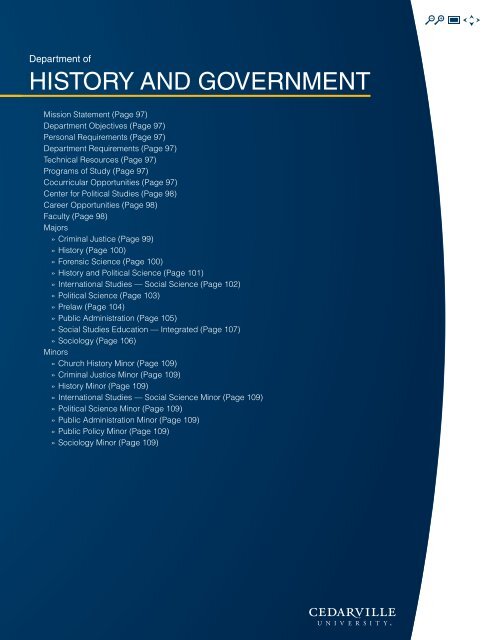
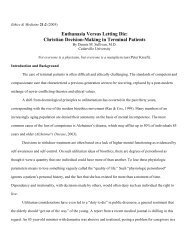
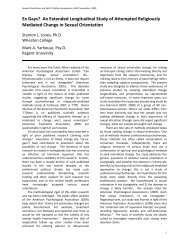

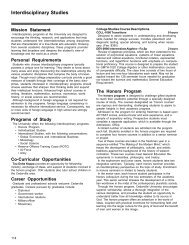
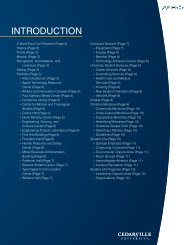
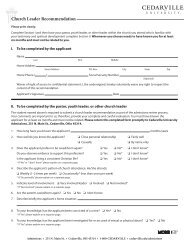
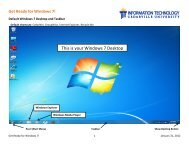
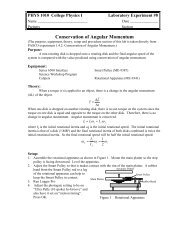
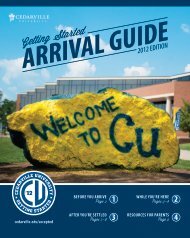
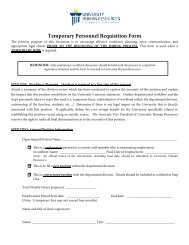
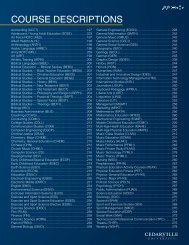
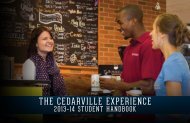

![Girls Volleyball Camp Brochure [PDF] - Cedarville University](https://img.yumpu.com/44713750/1/190x146/girls-volleyball-camp-brochure-pdf-cedarville-university.jpg?quality=85)
